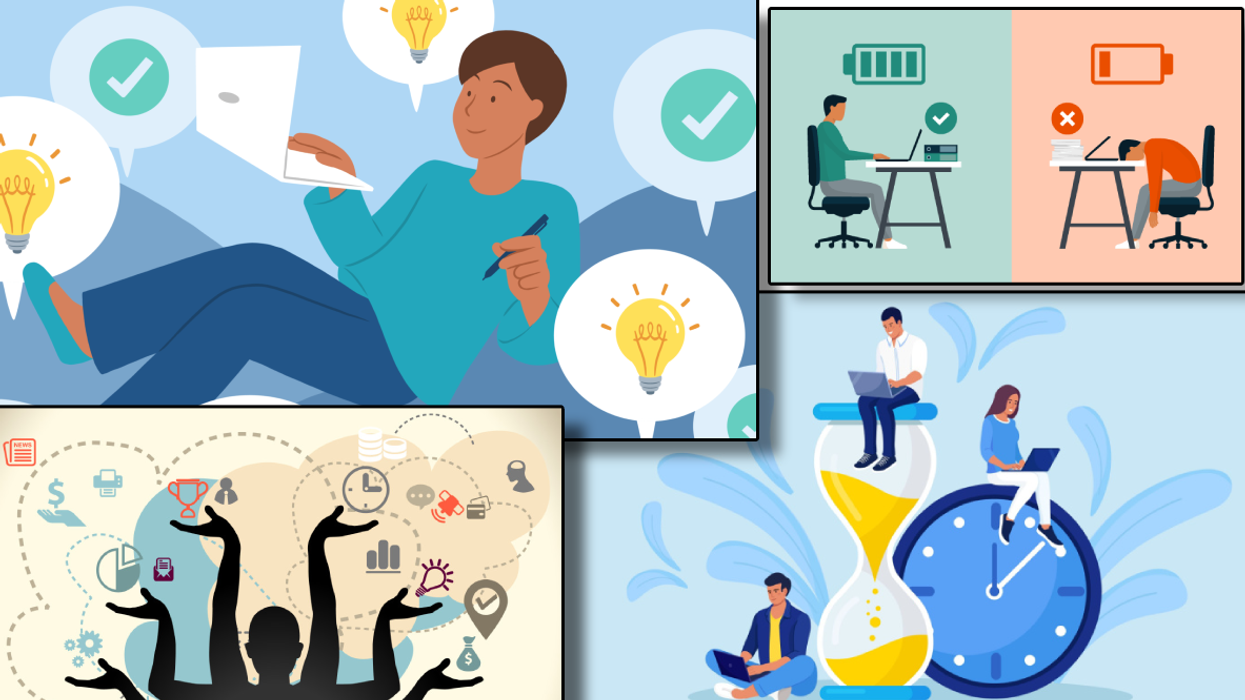What Should I Do Today? 10 Fun, Productive, and Effective Ideas For Tackling the Day
Life is busy. We work raise children, care for our parents, cook and clean, and spend innumerable hours in the car getting to and from these places and gathering necessary supplies. Rarely do we have hours spread before us where we’re asking ourselves, “What should I do today?”RELATED: Healthy Life: Improve Your Spiritual Wellness With These 10 Fulfilling TipsSo the question to be answered here is not what you should do with loads of free time at your fingertips. If that were the case, I’m betting that the vast majority of you would stop reading right now. Rather, the question is what exactly should you be doing in the time that you have to get where you want to be. And the answer -- of course -- depends on what you’re hoping the outcome will be. The destination might be right around the corner or years down the road, but it doesn’t have to be overwhelming.If a clean and well-organized house reduces your anxiety and is key to your work week unrolling without a hitch, then spending hours on Saturday washing floors and scrubbing the bathtub is not a waste. If you’re hoping for a promotion to a job whose requirements include a skill you don’t have, then taking that continuing education course online is exactly what you should be doing with your time.Buravleva Stock/ShutterstockIf you have a tendency to balk in the face of limitless possibilities, you’re not alone. It can be difficult to narrow down what it is we should be doing with our time. There are so many non-negotiable demands on those 24 hours—not the least of which is sleep. Then there are the countless “gurus” preaching about how we should eat, how we should dress, and how we should move during the day. It’s hard to not jump from one thing to the next, trying to improve our lives, be more productive and have more fun.Tourism WhistlerInstead of drastically overhauling your life, or thinking you need a 20-step master plan to become the best version of yourself, think in terms of the small things you can do to think better, feel better, and do better. And when you wake up in the morning, instead of stressing about the number of things that you need to accomplish in the hours ahead of you, take a moment to just be grateful for those hours and their possibilities. As Edith Wharton, the first woman to win the Pulitzer Prize in Fiction, once wrote, “Set wide the window. Let me drink the day.”So let’s follow that advice as we ask ourselves the question, “What should I do?”Ask Yourself, "What led me to where I am today?"Buravleva Stock/ShutterstockIn order to “set wide the window” on our day, it’s important to acknowledge the curtains—that is, what we’re pulling aside to start this day. We all show up to our day with a certain amount of baggage. It might be as complicated as past unresolved traumas or as simple (yet still aggravating) as having no dinner plan because you didn’t do the grocery shopping.Our capacity to check in—or our tendency to check out—depends a lot on past events. And while we can’t change them, we can acknowledge them and make a plan for moving forward. Ask yourself what led you to this exact moment. How far you reach into your past is up to you and depends on the particularities of your situation; but try to acknowledge the bumps in the road that might be holding you back.“Nothing is a waste of time if you use the experience wisely.”—Auguste RodinAfter you’ve acknowledged the events that have led you to this point, it will be easier to understand your emotional baseline. It’s important to make decisions from a healthy baseline and not out of fear or anxiety. At the same time, a healthy emotional baseline is not void of emotion. Some people are naturally more sensitive than others, more empathetic, and quicker to action or to anger. Some people are in a more heightened state of emotions more often than others. What’s important is a degree of self-awareness that will allow you to make healthier decisions.There are several things you can do to regulate your emotions, including healthy eating and getting enough sleep (more on that later). One key element to achieve a healthy emotional baseline is play. Playing helps us find our inner child and have fun. Laughing, moving, and being able to take life less seriously are excellent ways to let off steam and return to our emotional baseline. Play is also an excellent way to reconnect with friends and family members. Getting outside for a pickup soccer game, playing a board game, or taking 20 minutes out of our busy schedules to play hide-and-seek with our kids—these or any other of a number of fun things can make all the difference in reorienting ourselves.Speaking of those busy schedules, it’s not often a lack of wanting to play that keeps us from it. Why don’t we play more often? The answer is simple: life. It’s too busy; the days just fly by. This is why it is so important to treat play as something you need to do, not something you just want to do. Schedule it! Just as you wouldn’t miss that big meeting with the boss, block off your schedule for some time to play, to do something that fills your cup. Put it in your calendar and treat it with as much importance as a scheduled meeting or doctor’s appointment. It’s for your health, after all.So the next time you ask yourself, what should I do, maybe the answer isn’t to work harder but to play harder.What Kind of Work-Life Balance Are You Aiming For?Buravleva Stock/ShutterstockWhat would your ideal weekly schedule look like? How many days would you spend in the office as opposed to days at home? How important is advancement along your career path versus advancement in your home or family life? Is your working environment contributing to or taking away from your happiness? Are your life goals more aligned with your work or your leisure?These thought-provoking questions can help you step back from the daily grind and your tried-and-true way of providing for yourself and your family and get a better look at the big picture. There are many ways to live a more fun, more productive way of life, one that fulfills your immediate needs as well as your big-picture needs—but the only way to zero in on them is to clearly define both.Albert Einstein once said, “Imagination is everything. It is the preview of life’s coming attractions.” Think about how powerful that is. Indeed, the power of positive thinking has been well documented. It’s closely linked to self-fulfilling prophecy, or the idea that whatever you believe to be true about yourself, or the way things work in the world, will be true for you. A quote from Henry Ford adds commentary to Einstein’s thought: “Whether you think you can or you think you can’t, you’re right.”We spend much of our life at our jobs, usually at least a third. And when you think that you should (ahem) be spending another third of your 24-hour day sleeping, you realize how important it is to enjoy your work. It’s possible to feel fulfillment in any job and how you perform it, as long as it aligns with your life goals and helps you to attain a work-life balance that makes sense to you.If you’re wondering what one thing you could do today to take a step in the right direction in your career, it’s this: believe that anything is possible. Because it is.“There are always flowers for those who want to see them.”Henri MatisseBuravleva Stock/ShutterstockDon’t let preconceived notions of a difficult job market stop you. Don’t let your current level of education stop you. Don’t spend your entire life wondering what would have happened if…You have to learn a new language when it comes to getting what you want. If you love your career, it shows. If you hate it, it also has a big impact on your life. You have to change the way things are if what you want is something different than what you already have.But you can start with what you have. Find a career path that makes use of your skills and talents but also your passions. It’s a guaranteed formula for success. You’ll be good at a job that use your skills; when the job is also something you believe in, it will be rewarding. In such a working environment, success will be natural. You’ll make your way up in your career, resulting in a circle of results and rewards. Consider where you are now and where you want to go—and then fill in the stair steps that it will take to get there. Every lofty career goal (and life goal, for that matter) can be broken down into manageable steps. Lay them out, and the next time that you ask yourself, what should I do, start tackling the next step.Don’t fall into the trap of thinking that it’s too late, either. Karen L. Pepkin and Wendell C. Taylor wrote a whole book about people who achieved their dreams after the age of 60, people from all walks of life who didn’t let age hold them back. And as far as career goals go, consider this: if you’re in your mid-forties, you have two decades until you hit retirement age! That’s a long time to be “settling” for less than the best.The other half of the work-life balance is, of course, life. Don’t listen to people who tell you that the balance can’t be done. Everyone’s balance is different, so the key here is to prioritize.Identify Your Life GoalsBuravleva Stock/Shutterstock“The level of our success is limited only by our imagination.”AesopIs it possible to have it all? It depends on what that means to you. But more often than not, when we make a list of our priorities, certain patterns emerge. Rare is the person who, in fact, wants to be able to experience every avenue that life has to offer. Rather, our priorities underline the aspects of life that we value the most and the opportunities from which we’ll reap the greatest rewards.“Don’t sit down and wait for the opportunities to come. Get up and make them!”Madam C.J. WalkerWhen we define our life goals, there are some that will emerge as non-negotiable and others that are fuzzier. Working toward the first category is what will allow you to feel more productive, more self-fulfilled, and to have more fun—because the steps to get there are inherently more rewarding to you. The fuzzier ones may make their way in at some point, and if they don’t, you probably won’t even notice. After identifying your priorities, declutter your life. Get rid of the things that take a lot of time and bring little joy, such as participating in a committee that meets all the way across town or playing on a sports team whose practices are late at night when you have to work early the next morning.If it’s difficult to decide what to give up and what to keep, consider this: nothing is set in stone. If you give up that environmental committee that takes up a lot of hours of your week only to find that you really miss it, nothing is stopping you from joining back up next month. On the other hand, if you give up that competitive rock climbing club across town but find a weekend biking group close by that you enjoy just as much, what a win!10 New and Productive Things To Do TodayBuravleva Stock/ShutterstockWhat should I do today? What if the answer was something very small, very simple, that you could check off your list with style and ease? If you worry too much about achieving a greater goal, consider this quote from Helen Keller: “I long to accomplish a great and noble task, but it is my chief duty to accomplish small tasks as if they were great and noble.”Self-actualization is looking at yourself and analyzing your own ability to grow. When you take care of yourself (mind, body, and soul), you gain self-awareness and an energy that allows you to grow as a person. This, in turn, will allow you to accomplish tasks big and small to reach your goal. Below is a list of small tasks that you can build upon to reach a greater goal. If you’re asking yourself, what should I do today—pick one or more of the things below. They’re fun—and the positive benefits you’ll reap from them will leave you feeling more productive and more fulfilled. Show Gratitude Buravleva Stock/ShutterstockAfter the alarm clock goes off but before you get out of bed, take a minute or two to name three specific things you’re grateful for. This will set the tone for your day. In the evening, as you drift off to sleep, silently name three more.Make a new friendThink of someone in your life who you admire, someone you want to be like. Talk to them. Have coffee with them. Learn something from them that you can apply to your daily life.Cut your screen time by 20 minutesThat’s over two extra hours you’ll have in your week, without giving up your favorite TV shows!Thank someoneBuravleva Stock/ShutterstockWhether it’s for a gift or a favor, for something big or small, taking the time to thank someone for the positive impact they’ve had on your day will multiply those feelings.ApologizeDon’t allow anxiety to overshadow any part of your day. If you said or did something that you regret, don’t let it take up any more time in your day. Immediately seek out that person to clear the air. Even if you’re unsure it will be beneficial to say it: “I feel like I made that situation more awkward. I’m sorry.”Drink more waterWondering what to do in the ten minutes between dropping your son off for soccer and picking up your daughter from her piano lesson? Drink a glass of water or eat an apple. You’ll feel an instant increase in energy, and it’s good for you!Go outsideEven if it’s to take a lap around a commercial center during your lunch break, getting a breath of fresh air and a bit of sunshine does wonders for the mind. If you can take a quick walk in a forest or near a lake, you’ll be surprised at how much that helps you focus once you’re back inside.PlayBuravleva Stock/ShutterstockPlay a board game with your family. Throw a frisbee in the park with your dog. Play, however, you want to do it, is a fun way to develop your sense of self. All work and no play make Jack a dull boy.Do goodSometimes, taking care of others is a wonderful way to get you out of a funk and help renew your energy. And it’s something you can do right away, with very few resources! Take coffee and pastries to your local fire department. Help an elderly person get their groceries into their car. Give your child an extra hug when they come home from school. It was Anne Frank who said it best: “How wonderful it is that nobody needs to wait a single moment before starting to improve the world.”SleepBuravleva Stock/ShutterstockThis last thing you can do today will have exponential effects on your productivity and ability to achieve your dreams. The far-reaching benefits of sleep have been well documented. For starters, sleep gives you more energy, allows you to be more productive in your waking hours, and allows your brain to synthesize information it took in during the day. What should you do? Choose to be a better you every day. It’s not about constant success. It’s about knowing what to do in the face of failure and moving forward. Drink the day!“Start where you are, with what you have. Make something of it; never be satisfied!”George Washington Carver





























